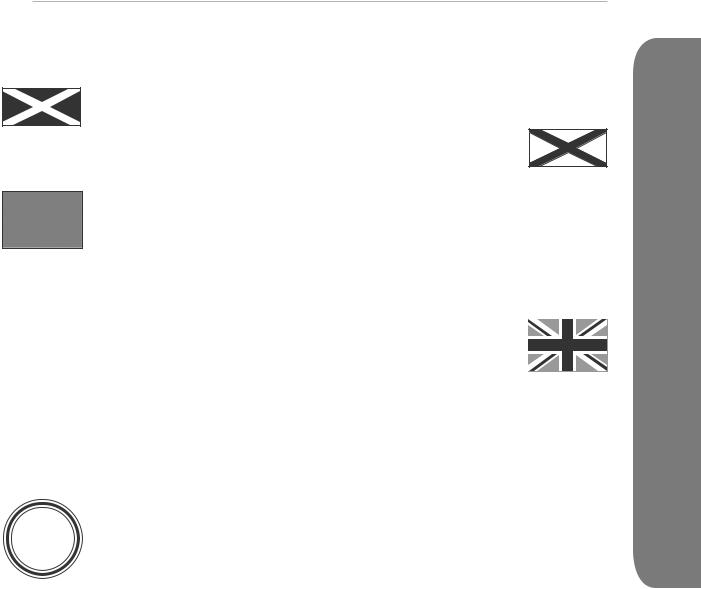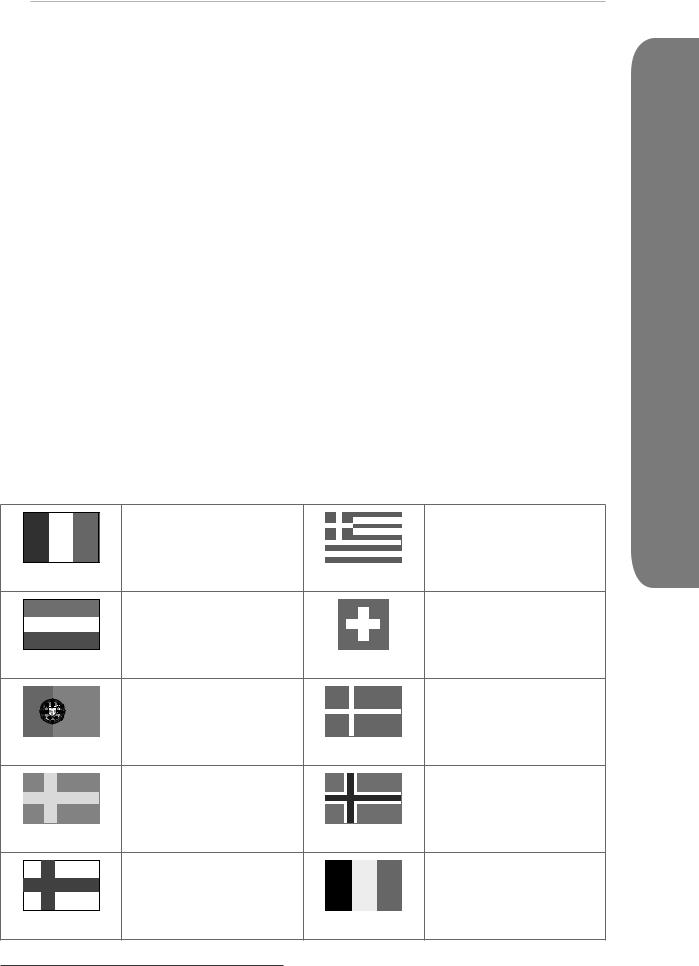
yastrebova_Part_1
.pdf
 Английский язык для международников и регионоведов. Часть I
Английский язык для международников и регионоведов. Часть I
Latin or French form Jacobus or Jacques. It was in his reign that Scotland joined England, and it was decided that the union should be represented symbolically by a new flag. As ‘jack’ once meant small, the name may be derived from a royal decree issued by Charles II that the
flag should be flown only by ships of the Royal Navy as a jack, a small flag.
The “Union Jack” is made up of three different national symbols: the cross of St George (a red cross on a white ground), the cross of St Andrew (a
diagonal white cross on a blue ground), and the cross of St Patrick (a diagonal red
cross on a white ground). The crosses are named after the patron saint of each country. St George is the patron saint of England; St Andrew is the patron saint of Scotland, and St Patrick is the patron saint of Ireland. The Welsh dragon does not appear on the flag because by the time the first Union Jack was created in 1606, Wales was
already united with England.
At first the flag consisted only of St George’s and St Andrew’s crosses. In 1801, with the union of Ireland and Great Britain, it became necessary to represent Ireland in the flag, and so the cross of St Patrick was included thus creating the flag as we now have it.
The name “Union Jack” became official when it was approved in Parliament in 1908. It was stated that “the Union Jack should be regarded as the National flag*”.
*see the fl ags in colour in Supplement
1.Guess the meaning of the words in italics from context; some words are explained in the text. Underlined words have similar English and Russian roots. Can you find other words of this kind in the text?
2.Now read your partner’s text to check what you have learnt from him/her.
Project |
PROJECT WORK 1 |
Work |
NATIONS AND NATIONALITIES |
When speaking about countries / continents / regions, their people, or culture besides the name of a particular place we very often need to know:
•the adjective used to describe its products, culture, history, etc.;
•the noun in the singular (в единственном числе) used for a person from this place;
•the word in the plural (во множественном числе) used for the nation as a whole or for a group of people of this nationality.
Your task is to find out
1.what these words are and how they are pronounced;
2.what patterns they follow;
3.what articles are used with these words;
4.if they are always capitalized.
Resources:
1.A Russian-English dictionary (e.g. Русско-английский словарь: Ок. 55000 слов. (под ред. Ахмановой О. С.). — М: Рус. яз., 1992).
2.An electronic dictionary (e.g. ABBY Lingvo 12 — многоязычный электронный словарь).
3.An on-line resource (e.g. www.multitran.ru).
4.English-English dictionary (e.g. Oxford Advanced Learner’s Dictionary).
5.Cambridge Grammar of English. Ronald Carter & Michael McCarthy. Cambridge University Press, 2006.
Chapter 1. Unit 1. Across the English Speaking World
21

Chapter 1. Unit 1. Across the English Speaking World
 Английский язык для международников и регионоведов. Часть I
Английский язык для международников и регионоведов. Часть I
STAGE 1. TEAM WORK
Work as a team of 3 or 4 students. Choose the head of your team. Decide how you are going to do the task, e.g. who is doing on-line research, who is working with a paper edition, etc. Set the time limit for each stage and the fi nal deadline.
STAGE 2. INDIVIDUAL WORK
1. Find out the information on the “nationality” words for the countries from the box.
England |
Ireland |
Spain |
Russia |
Greece |
The Netherlands |
Sweden |
Turkey |
Germany |
Scotland |
Vietnam |
the USA |
Japan |
Italy |
Denmark |
Wales |
|
|
|
|
2. Write down the adjectives for the following words and transcribe them paying attention to the changes in spelling and pronunciation.
Norway —
Wales —
Israel —
Spain —
Italy —
Iran —
China —
STAGE 3. TEAM WORK. COMPARE YOUR FINDINGS AND COMPLETE THE TABLE
|
COUNTRY |
ADJECTIVE |
PERSON |
NATION |
|
|
|
|
|
|
a) Australia |
Australian |
an Australian |
the Australians |
|
|
|
|
|
|
b) |
|
|
|
|
|
|
|
|
1 |
c) |
|
|
|
|
|
|
|
|
d) |
|
|
|
|
|
|
|
|
|
|
|
|
|
|
|
e) |
|
|
|
|
|
|
|
|
|
f) |
|
|
|
|
|
|
|
|
|
a) China |
Chinese |
a Chinese |
the Chinese |
|
b) Switzerland |
Swiss |
a Swiss |
the Swiss |
2 |
c) |
|
|
|
|
|
|
|
|
|
d) |
|
|
|
|
|
|
|
|
3 |
a) Finland |
Finnish |
a Finn |
the Finns |
|
|
|
|
|
b) |
|
|
|
|
|
|
|
|
|
|
|
|
|
|
22

 Английский язык для международников и регионоведов. Часть I
Английский язык для международников и регионоведов. Часть I
|
COUNTRY |
ADJECTIVE |
PERSON |
NATION |
|
|
|
|
|
|
c) |
|
|
|
|
|
|
|
|
3 |
d) |
|
|
|
|
|
|
|
|
|
e) |
|
|
|
|
|
|
|
|
|
a) Britain |
British |
a British person |
the British |
|
(Briton2) |
|||
|
|
|
|
|
|
b) France |
French |
a Frenchman / |
the French |
|
Frenchwoman |
|||
|
|
|
|
|
4 |
|
|
|
|
c) |
|
|
|
|
|
|
|
|
|
|
d) |
|
|
|
|
|
|
|
|
|
e) |
|
|
|
|
|
|
|
|
|
f) |
|
|
|
|
|
|
|
|
|
g) |
|
|
|
|
|
|
|
|
STAGE 4. WHICH TEAM CAN DO IT FASTER? FILL IN THE GAPS WITH THE CORRECT NATIONALITY WORD (See the flags in colour in Supplement).
This is the ____________ |
This is the ____________ |
flag. |
flag. |
France |
Greece |
This is the ____________ |
This is the ____________ |
flag. |
flag. |
the Netherlands |
Switzerland |
This is the ____________ |
This is the ____________ |
flag. |
flag. |
Portugal |
Denmark |
This is the ____________ |
This is the ____________ |
flag. |
flag. |
Sweden |
Norway |
This is the ____________ |
This is the ____________ |
flag. |
flag. |
Finland |
Belgium |
2 Briton is mostly used in newspaper headlines.
Chapter 1. Unit 1. Across the English Speaking World
23

Chapter 1. Unit 1. Across the English Speaking World
 Английский язык для международников и регионоведов. Часть I
Английский язык для международников и регионоведов. Часть I
READING 2. A GLIMPSE INTO THE HISTORY OF THE UK
PRE-READING TASK: MAKE UP FACT FILE ON THE UK
What basic facts do you know (geographical situation, territory, population, political system, history, etc.)?
Now read the text to fi nd more information to add to your fi le.
Text 1. The United Kingdom?
England,Scotland,WalesandIrelandwereoncecustomarilyknownastheBritishIsles.Thephrase is still used as a geographical expression. But even as such the term must be used with caution. In fact, the people of these islands have seldom been united, politically or culturally. Efforts were made to unite them since the 12th century but they only came under the same monarch in 1603, and the complete political union, which was at last achieved in 1801, endured only for 120 years.
The first attempt at unity was made by the Norman king Edward I at the end of the 13th century. He succeeded in Wales where huge Norman castles were built and their lords guarded the frontier. Edward I emphasized his conquest of Wales by conferring the title of prince of Wales in 1301 on his eldest son. The title has been regularly given to the eldest son of the reigning monarch ever since. Norman colonization of Ireland, though, did not stretch far beyond Dublin and the coastal towns. In Scotland, Edward failed disastrously.
It was not till the reign of Elizabeth that Scotland was brought — and brought permanently — into the orbit of England. The Scottish dependence on England was achieved by diplomacy and was completed in 1603 by the succession of James VI, to the throne of England as James I.
In the same year the most formidable Irish rebellion was crushed; and James I as the ruler of the three kingdoms could style himself King of Great Britain. But it was a fragile union, and it disintegrated in the next reign.
The third attempt to unify all the three kingdoms was marked by the Act of Union with Scoland in 1707. This Act also illustrates the differences between English policy in Scotland and English policy in Ireland, which were the results of the revolutions of the 17th century. While the Act of Union with Scotland was being negotiated, the Irish House of Commons passed a resolution requesting a similar union, but the English government declined to consider it. The Union of Britain with Ireland came nearly a century later — in 1801. By that time the Irish Parliament was reluctant and the British government had to use wholesale bribery in order to achieve it.
Britain has never been a completely unitary state. It has never had under the same Crown one legislature, one established church, one law. The period from 1800 to 1922 is the period during which unity was most nearly achieved. Even so it was a fragile unity and cracks were not long in appearing. In 1921 a treaty was signed giving dominion status to Ireland with Ulster (Northern Ireland) remaining within the United Kingdom. Since 1922 the process of unification has been reversed. The greater part of Ireland is independent, and there are political parties which advocate separation and independence for Scotland and Wales.
Comprehension questions:
1.Why should one be careful when using the phrase “the British Isles”?
2.When was the first attempt at unity made? Was it successful?
3.What difficulties did the union with Ireland present?
4.Can Great Britain be described as a unitary state? Why?
5.What does the question mark in the title imply?
24

 Английский язык для международников и регионоведов. Часть I
Английский язык для международников и регионоведов. Часть I
Text 2. The British Empire
PRE-READING QUESTIONS:
1.What is an empire? In what way is it different from other states? Is there a second meaning of the word? (Give examples)
2.The world has witnessed the rise and fall of many empires. Can you name a few?
3.Think about the history of the Russian Empire. What facts do you remember?
Read the text about the British Empire and point out the stages in Britain’s empire building.
At the beginning of the 20th century the British Empire covered more than one fifth of the land mass of the globe; it had interests on every sea, and was the largest empire the world had ever known. At that time London was the centre of the world, and children learned phrases which expressed in simple terms the “truths” which the British regarded as paramount: The sun never sets on the British Empire; India is the brightest jewel in the Imperial Crown; Britannia rules the waves.
The first stage in Britain’s empire-building began in the reign of Elizabeth I. The colonies in Virginia and New England along the east coast of North America were central to the First British Empire. After the revolt of the thirteen original British colonies in 1776, the flag of the infant United States was raised, which is usually taken as marking the beginning of a second British Empire. Its foundations were laid in 1750–1850, during which Britain acquired India, Australia, Canada, New Zealand and other territories. The colonization of Australia and New Zealand and, later South Africa was mostly settling and cultivating unoccupied lands. In India, a high civilization more ancient than Europe, which became the centre-piece of the second British Empire, the situation was different. It demanded new diplomatic skills. The unwise treatment of Indian soldiers in British pay resulted in revolt in 1847 which quickly became a national movement against foreign rule.
It was India with its strong independence movement that eventually started the disintegration of the British Empire. After 1945 the Empire collapsed in a matter of 20 years, leaving a legacy of British-influenced institutions, (the British Commonwealth of Nations with Queen Elizabeth II as its head) and, in some cases, anti-British feelings.
INFERRING
When you read a text some details are not stated clearly but can be understood (inferred) from the other details which are stated.
1.What do the “truths” about the British Empire tell the reader?
2.How was colonization of India different from that of other territories?
3.How did this affect the future of the British Empire?
DISCUSSION QUESTIONS:
1.What relations prevail within the former empire? Why?
2.Is it inevitable that empires eventually collapse?
3.Looking back at ancient and recent history can you point out possible consequences of the disintegration of empires?
Chapter 1. Unit 1. Across the English Speaking World
25

Chapter 1. Unit 1. Across the English Speaking World
 Английский язык для международников и регионоведов. Часть I
Английский язык для международников и регионоведов. Часть I
|
PROJECT WORK 2 |
Project |
HOW INDEPENDENT ARE SCOTLAND, WALES |
Work |
AND NORTHERN IRELAND WITHIN THE UK? |
TASK 1
Find out the following
1.How are these parts represented in the British Parliament?
2.How much autonomy does the Scottish Parliament have?
3.What are the powers of the National Assembly in Wales and in Northern Ireland?
4.Is there the English Parliament?
TASK 2.
Make your conclusion and present it to the class in a 3–5 minute talk.
Resources:
http://en.wikipedia.org/wiki/British_monarchy
http://en.wikipedia.org/wiki/United_Kingdom
http://en.wikipedia.org/wiki/Parliament_of_England
http://en.wikipedia.org/wiki/Scotland
http://en.wikipedia.org/wiki/National_Assembly_for_Wales
http://en.wikipedia.org/wiki/Northern_Ireland_Assembly
http://lve.scola.ac-paris.fr/anglais/ukpoliticalsystem.php
http://www.britainusa.com/sections/index_nt1.asp?i=41010&d=12
VOCABULARY LIST
Ex. 1. Study the Vocabulary List and translate all the examples.
1. |
customarily |
обычно, традиционно, как правило |
|
adv. |
Customarily, students take two years to complete the Master’s programme. |
|
|
|
|
customary, |
обычный, привычный |
|
adj. |
It is customary to serve roast turkey at Thanksgiving. |
|
|
На День благодарения принято подавать жареную индейку. |
|
|
|
|
custom, n. |
обычай; привычка |
|
|
age-long / local custom древний / местный обычай |
|
|
to follow / observe a custom соблюдать обычай |
|
|
Custom is a second nature. = Привычка — вторая натура. |
|
|
|
|
customer, n. |
клиент, покупатель |
|
|
|
2. |
attempt, n. |
попытка |
|
|
to make / to give up an attempt |
|
|
at the first / second / … attempt |
|
|
an attempt to do / at doing smth |
|
|
an attempt at smth |
|
|
He made a weak attempt to justify / at justifying his behavior. |
|
|
an attempted revolution / crime / etc. |
|
|
|
26

 Английский язык для международников и регионоведов. Часть I
Английский язык для международников и регионоведов. Часть I
|
attempt, v. |
пробовать, пытаться |
|
|
|
|
to attempt smth / to do smth / doing smth |
|
|
|
|
Very few prisoners attempted to escape from Alcatraz. |
|
|
|
|
|
World |
|
3. |
succeed, v. |
достигать цели, преуспевать, иметь успех |
||
|
||||
|
|
to succeed in life / one’s career / doing smth |
|
|
|
|
If at first you don’t succeed, try, try again |
Speaking |
|
|
|
Терпение и труд все перетрут. |
||
|
|
|
||
|
|
|
|
|
|
success, n. |
успех, удача. |
|
|
|
|
to have / achieve success in (doing) smth |
English |
|
|
|
great / considerable / little success |
||
|
|
|
||
|
|
Proper planning is the key to success. |
|
|
|
|
I’ve tried to stop smoking several times but without success. |
|
|
|
|
to be a success with smb |
the |
|
|
|
This opera has always been a success with the public. |
||
|
|
Эта опера всегда пользовалась успехом у широкого зрителя. |
Across |
|
|
|
|
||
|
|
Success is never blamed. Победителей не судят. |
|
|
|
|
|
|
|
|
successful, |
успешный, удачный, имеющий успех |
1. |
|
|
adj. |
They are successful in everything they do. |
||
|
Unit |
|||
|
|
a successful politician / lawyer / businessman / film / business / etc. |
||
|
|
Indians fought the settlers, but none of their tactics was successful. |
||
|
|
|
1. |
|
4. |
stretch, v. |
1. растягивать(ся), вытягивать(ся), удлинять(ся) |
||
Chapter |
||||
|
|
Jack stretched (out) his hand and caught the mosquito. |
||
|
|
|
||
|
|
Anna stretched on the bed, watching TV. |
|
|
|
|
to stretch one’s legs размять ноги, прогуляться |
|
|
|
|
2. простираться; продолжаться, длиться |
|
|
|
|
We were caught in a traffic jam that stretched as far as the eye could see. |
|
|
|
|
to stretch for miles |
|
|
|
|
to stretch from Dover to London |
|
|
|
|
to stretch back many / 20 / over 30 years / to the 1970s |
|
|
|
|
The commercial links between Britain and the Muslim world stretch back |
|
|
|
|
a very long time. |
|
|
|
|
Торговые связи между Британией и мусульманским миром имеют очень |
|
|
|
|
долгую историю. |
|
|
|
|
|
|
|
|
stretch, n. |
участок, отрезок; промежуток времени |
|
|
|
|
There have been a lot of accidents on this stretch of the highway. |
|
|
|
|
During a stretch of many months, I tried many diets and many pills. |
|
|
|
|
|
|
|
5. |
decline, v. |
1. уменьшаться, идти на убыль |
|
|
|
|
In summer, the number of customers declined from 150 to 50. |
|
|
|
|
The profits of the company have declined by 15 per cent. |
|
|
|
|
to decline in importance |
|
|
|
|
2. приходить в упадок, ослабевать, чахнуть |
|
|
|
|
The fur industry has declined dramatically in the last ten years. |
|
|
|
|
declining morality / health |
|
|
|
|
3. отказываться, отклонять |
|
|
|
|
to decline to do smth |
|
|
|
|
to decline an offer / an invitation |
|
|
|
|
Rob asked Chloe to the dance, but she declined the invitation. |
|
|
|
|
|
|
27

Chapter 1. Unit 1. Across the English Speaking World
 Английский язык для международников и регионоведов. Часть I
Английский язык для международников и регионоведов. Часть I
|
decline, n. |
падение, спад |
|
|
After the revolution, the country has been in decline. |
|
|
to fall / go into decline приходить в упадок |
|
|
a significant / dramatic / gradual decline in sales / customers / |
|
|
prices /rate of unemployment, etc. |
|
|
|
6. unite, v. |
соединять(ся), объединять (ся) |
|
|
|
People of all nationalities united to free their country. |
|
|
to unite against a common enemy |
|
|
|
|
united, adj. |
1. соединенный, объединенный; общий |
|
|
to make a united effort предпринимать общие / совместные усилия |
|
|
the United Nations Organization, the United Kingdom, the United States |
|
|
of America. |
|
|
United we stand, divided we fall В единстве — сила. |
|
|
2. дружный |
|
|
united family |
|
|
|
|
union, n. |
союз, объединение |
|
|
a political / economic union between neighboring countries |
|
|
Why did the colonists break their union with the British Empire? |
|
|
|
|
unity, n. |
единство, сплоченность, согласие |
|
|
national unity национальное единство |
|
|
to achieve / destroy / preserve / restore unity between two nations |
|
|
Can unity among English-speaking countries ever be achieved? |
|
|
Before Myanmar became a British colony, its people had lived in unity with |
|
|
each other. |
7.separate, v. 1. отделять(ся), разъединять;
[ ] We are separated by a long distance.
] We are separated by a long distance.
Residents are asked to separate ordinary waste from materials that can be recycled.
2. разлучать; расставаться
Among other things, the Red Cross connects families separated by war.
Tom Cruise and Nicole Kidman decided to separate after more than ten years of marriage.
separation, n. |
1. отделение, разъединение |
|
|
|
Many nationalists believe that Quebec’s separation from the rest of Canada |
|
|
is very possible. |
|
|
2. разлука, расставание |
|
|
a long separation |
|
|
|
separate, adj. |
отдельный, изолированный |
|
[ |
] |
separate rooms / entrance / category |
|
|
After the incident, they went their separate ways and almost became enemies. — |
|
|
После происшествия их пути разошлись, они стали почти врагами. |
|
|
|
inseparable, |
неотделимый |
|
adj. |
|
Dragons are an inseparable part of the Chinese culture. |
|
|
inseparable companion неизменный спутник |
|
|
inseparable union неразрывный союз |
|
|
inseparable friends неразлучные друзья |
28

 Английский язык для международников и регионоведов. Часть I
Английский язык для международников и регионоведов. Часть I
8. |
effort, n. |
усилие, попытка |
|
|
|
|
physical / mental effort |
|
|
|
|
big / brave / heroic / remarkable / (un)successful / fruitless effort |
|
|
|
|
joint effort(s) |
World |
|
|
|
to make every effort to do smth |
||
|
|
to make an effort |
|
|
|
|
He spared no effort to learn languages. |
Speaking |
|
|
|
Он не жалел сил на изучение языков. |
||
|
|
|
||
|
|
to do smth with / without effort |
|
|
|
|
All students have put a lot of effort into the performance. |
|
|
|
effortlessly, |
Все студенты вложили много сил в подготовку представления. |
English |
|
|
легко, без усилий |
|||
|
|
The police started using mobile cameras in an effort to catch speeding drivers. |
|
|
|
adv. |
|
the |
|
|
|
|
||
|
|
|
Across1. |
|
9. |
sign, v. |
подписывать (ся) |
||
|
||||
|
|
to sign a document / a letter / an agreement / etc. |
|
|
|
|
to sign an agreement with smb |
|
|
|
|
|
|
|
|
sign, n. |
признак, свидетельство |
Unit |
|
|
|
to take smth as a sign of smth |
||
|
|
to show signs of worry / depression / etc. |
||
|
|
He showed no signs of anger. |
1. |
|
|
|
Он никак не показывал, что сердится. |
Chapter |
|
|
|
a sign of the times примета времени |
||
|
|
|
||
|
|
|
|
|
|
signature, n. |
1. подпись |
|
|
|
|
to put one’s signature to the document |
|
|
|
|
2. подписание (документа) |
|
|
|
|
to bring papers for signature |
|
|
|
|
the signature of the treaty |
|
|
|
|
|
|
VOCABULARY PRACTICE
Ex. 2. Fill in the gaps with the correct word. The fi rst letter is given to help you.
1.The old man took his c_______ place at the head of the table.
2.At the concert, I was surprised that celebrities put so much e_______ into a show.
3.He was a s______ lawyer, but he decided to change careers at the age of 40 and become an artist.
4.For kids, s_______ is important, and in a well-organised school children s_______ in gaining new knowledge and skills each day.
5. With a history s_______ing back some 2,000 years Cologne ([ ]) is one of Germany’s oldest cities.
]) is one of Germany’s oldest cities.
6.The economy of the country has been harmed by periodic d_______s in oil prices.
7.In 1900, Queen Victoria s_______ the document which u_______ six different colonies as the Federal Commonwealth of Australia.
8.Here the footpath ended, so we had to walk along a s_______ of country road.
9.In the late 1990s, there were still a lot of politicians against a u_______Germany.
10.Most children whose parents s_______ and divorce are of school age.
11.Never s_______ a cheque before you use it.
29

Chapter 1. Unit 1. Across the English Speaking World
 Английский язык для международников и регионоведов. Часть I
Английский язык для международников и регионоведов. Часть I
12.If there is any word you don’t understand, you should make an e_______ and think over in what meaning the word is used.
13.A pencil is made of two s_______ pieces of wood which are glued together.
14.When she failed to send a thank-you card, her friend took it as a s____ of ingratitude (неблагодарность).
15.Read and re-read any documents you have to put your s_______ to.
16.Many teenagers begin to smoke in an a_______ to look more adult.
Ex. 3. Translate the following sentences paying special attention to the Active Vocabulary.
1.Marriage is a union between a man and a woman.
2.After the revolution, the economic growth of the country declined.
3.Americans are sure that for more than a century their country has spared no effort to defend and promote democracy around the world.
4.Charles looked at Mr. Taylerson with his customary disbelief.
5.Despite the government’s effort to reach a compromise, the threat of a revolt remains.
6.For Beijing (Пекин), Tibet has been an inseparable part of China since the 13th century.
7.In 1215, King John of England was forced to sign the Magna Carta (Великая хартия вольностей), which gave the people certain rights.
8.I’m glad the festival was a success.
9.Every time you speak make an effort to sound happy.
10.Mobility is the sign of the times. In many organizations employees spend more time on airplanes than at the office.
11.Mountain areas show signs of global warming.
12.Preparation is the key to success in exams.
13.Susan spent £ 3,000 on driving lessons over four years before passing her test at the 29th attempt.
14.Some actors played so well that they succeeded in making everyone hate them.
15.Money separates more friends than it unites.
16.The 13th century in Europe was an era of stability and unity.
17.The criminals were arrested as they attempted to board the flight to Chicago.
18.The end of the Iran-Iraq war led to a decline in exports and to the bankruptcy of two major oilexporting firms.
19.When the first Union Flag (Юнион флаг) was created in 1606, Wales was already united with England and was no longer a separate principality (княжество).
20.We stretched our legs by walking around the airport several times.
Ex. 4. Match a verb in A with a noun in B. Some words can form several collocations.
A |
B |
to achieve |
an attempt |
to make |
success |
to follow |
into decline |
to go |
unity |
to fall |
a custom |
to put |
(an) effort |
to restore |
one’s signature |
Use these collocations in sentences of your own.
30
